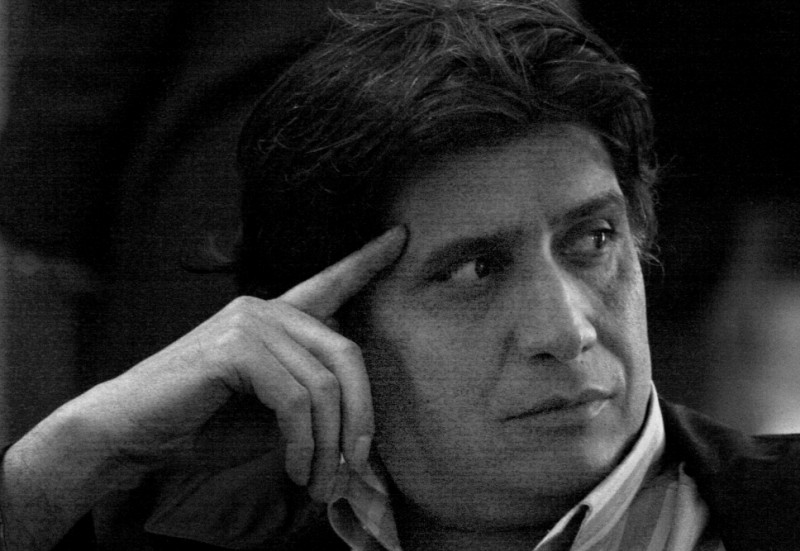
Iranian Television Producer and Author, Mostafa Azizi is arrested a month after his return to Iran from Canada. Photo by Mahdi Delkhasteh via Wikipedia (Public Domain Attribution).
After years of living in Toronto as a permanent Canadian resident, author and TV producer Mostafa Azizi moved back to Iran in January 2015. On February 1, he was arrested and put in solitary confinement at the country's infamous Evin prison. Next he was moved to the IRGC-controlled Ward 2-A, until finally being transferred to the lower-security Ward 8, Unit 7, in March.
Arash Azizi, Mostafa's son, told Global Voices over the phone that the news of his father's arrest only went public on March 28, 2015:
I've known about his arrest for quite some time, but our family's decision was not to publicise it, and not make it political. Recently they came to the conclusion that they need to publicise it.
According to an anonymous source published in Human Rights Activists News Agency, Azizi has been charged with “insulting the supreme leader”, “affronting the founder of the Islamic revolution”, “propagandizing against the regime”, and “conspiracy against the regime” and “public order”.
Prior to emigrating to Canada, Azizi produced educational and scientific programs for Iranian National Radio, until moving into television as the director of the Computer Animation Unit of the country's national broadcaster, the Islamic Republic of Iran Broadcasting. He moved to Canada in 2009, where he was a prominent cultural figure in Toronto's Iranian community. He founded Alternate Dream Productions, and hosted a centre called Farhang Khaneh (House of Culture) which became a centre for cultural events, such as script writing workshops and film screenings.
According to his son, Azizi decided to return to Iran because of the moderate political climate and the current Rouhani Administration's declarations that Iranians living abroad should return to live and work and safely in their native country. A Committee for the Return of Expat Iranians was created inside the Intelligence Ministry, led by the Deputy Foreign Minister for Consular, Parliamentary, and Iranian Expatriate Affairs Hassan Qashqavi. In a November 2013 statement, Qashqavi said:
The reason many Iranians do not return to Iran is the [fear] induced by Iranian opposition groups abroad. In my opinion, many of these fears are self-made. This fear has no root.
Arash Azizi said his father took these officials at their word:
Qashqavi said that Iranians abroad should come home, and that there would be no problems for 97 percent of them. My dad hasn't been doing anything political, he's an artist. His “crimes” are based on his Facebook posts, and the nature of his charges are based on the government's social media monitoring of his posts. He went back to live his life as promised by the images of change and moderation. He had moved back, given up his home in Canada, and was there for good, and was very happy to see his sick father. To this day what he wants is to live in Iran. We want him to serve his time -not a long sentence we hope -and continue to live there in his own country.
Iran is known for monitoring politically sensitive content on social media, which is supposedly where police collected their incriminating evidence against Azizi. The IRGC recently announced the implementation of a new surveillance operation known as “Ankaboot” (Spider) that intends to monitor Facebook pages for “corruption” and Western-inspired lifestyles. This program has played a role in several recent arrests, though similar police work was not uncommon before the launch of “Ankaboot”. In July 2014, eight Facebook users were sentenced to a combined 127 years in prison for their activity on Facebook, which the authorities said “acted against national security, spread propaganda against the establishment, insulted the sacred, and insulted the heads of the Islamic Republic”. Azizi has since disabled his social media accounts and websites. His son told us the government had created an archive of his posts from while he was active.
Amir Rashidi, an Iranian security researcher, told Global Voices:
None of these arrests are related to technical computer hacks, but based on the information users give away themselves. Weak passwords or passwords given away by detainees…The main purpose of these detentions and threats are to create fear.
Azizi is well known in Toronto's Iranian community. Anoosh Salahshoor, an Iranian-Canadian law student and a member of a Toronto cultural center where Azizi was active, said of the man:
A very active guy, with a huge passion for making sure that the voice of other less fortunate people was heard. He also connected really well with the younger generation.








5 comments
BESTIAS!
thanks…